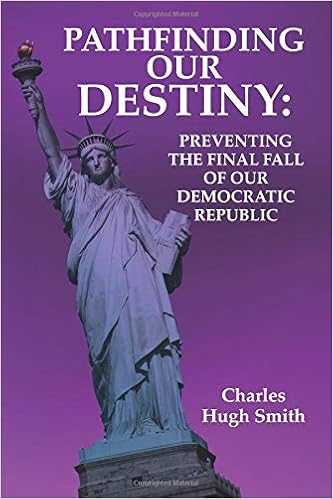Home » Posts tagged 'peak prosperity' (Page 7)
Tag Archives: peak prosperity
U.S. SHALE OIL INDUSTRY: Not In The Business To Make Money, But To Take Money
U.S. SHALE OIL INDUSTRY: Not In The Business To Make Money, But To Take Money

The U.S. Shale Oil Industry has been a financial trainwreck since day one. And, with nearly $300 billion in public and private debt racked up by the shale industry since its inception, that hasn’t stopped investors from throwing good money after bad to continue the biggest energy Ponzi scheme in history.
Unfortunately, the worst is still yet to come because the industry hasn’t provided the market with analysis on what happens to the shale oil companies and investors holding their debt when production finally peaks forever. I don’t believe the market has any idea just how quickly and violently the U.S. Shale Oil Industry could implode. Get ready for the Sun to Set on the U.S. Shale Oil Industry.
Veteran oil analyst, Art Berman, mentioned in his interview on Peak Prosperity that he believes the oil industry “IS DONE.” He also explains why the U.S. Shale Industry is not in the business of making money, but rather, taking money. I highly recommend “ALL,” my followers to listen to the interview below as it confirms the dire energy predicament we face:
In my last video update, DOW, GOLD & SILVER: Markets Disconnect In 2019, I explained the following image below which is a typical shale well completion layout and the tremendous amount of equipment needed to frac and produce shale oil and gas. What we need to understand about shale industry is that it consumes so much more energy (capex, equipment & labor) to produce oil, there is less available net energy to provide real economic growth. Furthermore, a larger segment of the economy is driven by the enormous amount of shale energy activity that when it falls back into a recession-depression, it will have a much more negative impact on the U.S. economy.

…click on the above link to read the rest of the article…
The Shale Oil Revolution Actually Reflects a Nation in Decline

Shutterstock
The Shale Oil Revolution Actually Reflects a Nation in Decline
Here in the opening month of 2019, as the US consumes itself with hot debate over a border wall, far more important topics are being ignored completely.
Take US energy policy. In the US press and political circles, there’s nothing but crickets sounding when it comes to serious analysis or any sort of sustainable long-term plan.
Once you understand the role of energy in everything, you can begin to appreciate why there’s simply nothing more important to get right.
Energy is at the root of everything. If you have sufficient energy, anything is possible. But without it, everything grinds to a halt.
For several decades now the US has been getting its energy policy very badly wrong. It’s so short-sighted, and rely so heavily on techno-optimism, that it barely deserves to be called a ‘policy’ at all.
Which is why we predict that in the not-too-distant future, this failure to plan will attack like a hungry wolfpack to bite down hard on the US economy’s hamstrings and drag it to the ground.
Shale Oil Snafu
America’s energy policy blunders are nowhere more obvious than in the shale oil space, where it’s finally dawning on folks that these wells are going to produce a lot less than advertised.
Vindicating our own reports — which drew from the excellent work of Art Berman, David Hughes and Enno Peters’ excellent website — the WSJ finally ran the numbers and discovered that shale wells are not producing nearly as much oil as the operators had claimed they were going to produce:
Fracking’s Secret Problem—Oil Wells Aren’t Producing as Much as Forecast
Jan 2, 2019
…click on the above link to read the rest of the article…
Singing Frogs Farm: The Science Of Healthy Soil
Singing Frogs Farm: The Science Of Healthy Soil
Three years ago, I interviewed Paul and Elizabeth Kaiser about the remarkably effective model being pioneered at their farm, Singing Frogs Farm, a small micro-farm in northern California. It quickly became one of Peak Prosperity’s most popular podcasts of all-time.
Developed over years of combining bio-intensive land/forestry management theory with empirical trial & error, the farming practices at Singing Frogs have produced astounding results.
First off and most important, no tilling of any kind is done to the soil. No pesticide/herbicide/fungicide sprays (organic or otherwise) are used. And the only fertilizer used is natural compost.
These practices result in a build-up of nutrient-dense, highly bio-rich topsoil. Where most farms have less than 12 inches of ‘alive’ topsoil in which they can grow things, Singing Frogs’ extends to a depth over 4 feet(!).
This high-carbon layer of soil retains much more water than conventional topsoil, requiring much less irrigation than used at most farms (a very important factor given the historic drought the West is suffering).
All these advantages combine to enable Singing Frogs Farm to produce 5-7 harvests per year on their land, vs the 1-2 harvest average of other farms. And since the annual crop yield is so much higher, so is the revenue. Most other farms in northern California average $14,000 in gross revenue per acre. Singing Frogs grosses nearly $100,000 per acre — a stunning 5x more.
This week, I sit back down with Paul and Elizabeth to discuss the science behind their latest farming practices & techiniques, the importance of biology over chemistry when it comes to gardening, and the hands-on workshops they offer, and what they think it takes to make a ‘resilient farmer’.
…click on the above link to read the rest of the article…
Is This Downturn A Repeat of 2008?

Getty images
Is This Downturn A Repeat of 2008?
Even people who don’t follow the stock market closely are aware that the global economy is weakening and appears to be heading into recession.
For those who track the stock market, the signs are ominous: the U.S. was the last major market to notch gains this year and in October the U.S. market followed the rest of the global markets into an extended slide which has yet to end.
Just as sobering, key sectors such as oil, banking and utilities have crashed with alarming ferocity, reaching oversold levels last seen in 2008 as the global financial system was melting down.
These sectors crashing sends an unmistakable signal: the global economy is heading into a potentially severe recession and assets will not be rising in value in a recessionary environment. So better to sell risk-assets like stocks now rather than later, and rotate the money into safe assets such as Treasury bonds.
And indeed, households now own more Treasuries than the Federal Reserve–a remarkable shift in risk appetite.
Many other indicators of recession are in the news: auto and home sales and global trade are all slumping.
Are we in a repeat of the global financial meltdown and recession of 2008-09? The sharp drop in equities is certainly reminiscent of 2008. Indeed, the December decline is the worst in a decade. Or are we entering a different kind of recession, the equivalent of uncharted waters?
And if we are entering a recession, what can central banks and governments do to ease the financial pain and damage? We can’t be sure of much, but we can be relatively confident central banks and states will respond to the cries to “do something.” This poses two questions: what actions can central banks/states take, and will those policies work or will they backfire and make the recession worse?
…click on the above link to read the rest of the article…
2019: The Beginning Of The End (Free Premium Report)

2019: The Beginning Of The End (Free Premium Report)
Welcome to our new readers and a very Happy New Year to everyone!
Now that it’s 2019, we’re going to start the new year here at Peak Prosperity by responding to the wishes of our premium subscribers and making our most recent premium report free to everyone.
For those unfamiliar with our work, it’s based on the idea that humanity is hurtling towards a disaster of our own making. Several powerful and unsustainable trends are all converging towards an ever-narrowing gap in the future.
Because of this, the individual and collective choices we make today take on ever-increasing importance. Our collective choices — around such issues as rampant money-printing by central banks, the failure to wean ourselves off of fossil fuels, and tossing an entire younger generation under the bus because that’s most convenient for an older generation afraid of living within its actual means — are all pointing to a diminshed and disappointing future. We need to make better choices that align ourselves with these (and many other) looming realities.
This is our work here at Peak Prosperity.
For ten years now, we’ve been pointing out the many predicaments society faces. And we will continue our vigilance. No because we enjoy crisis, or that we relish delivering hard messages, but because these are the times in which we live — and those, like you, who are awake to reality, need unvarnished facts and data to make informed decisions.
So we offer to you, today, a peek behind our premium subscription curtain. The people who subscribe to our work do so to make themselves more resilient, as well as to support Peak Prosperity financially as we carry on our mission of “Creating a world worth inheriting”, which invoves bringing difficult messages to reluctant audiences.
…click on the above link to read the rest of the article…
The Ghost Of Christmas Future
Here in the brief period between Christmas and New year’s, as a writer I am obligated to say happy, wishful things. I have to confess, I’m just not feeling it this year, so I’ll just do the minimum here and return to being a curmudgeon, because that’s what the times call for.
So, happy new year. I hope everything works out well for you in 2019.
There, with that behind us we can now return our attention to the true state of the world, which is deteriorating and getting worse.
For most people things will be decidedly worse, not better, as things progress along their current trajectories. The only planet we’ve got to live on is being killed by human activity and gross inattention, while economically the greatest and most ill-advised credit bubble in all of human history flirts with the sort of sudden disaster that follows shortly after the failure of one’s reserve parachute.
As I’ve often repeated, I truly wish this weren’t the case. I don’t have a “bummer gene” that relishes bad news nor do I enjoy being “that guy” who says what no one wants to hear.
Many of you reading this know exactly what I’m talking about. You, too, had to keep your lips zipped over the holidays lest the strained family small talk and opening of cheaply-made forgettable gifts be ruined by any talk of ‘reality’. Sure, everyone can inwardly wince at uncle Jack’s sixth bourbon and tolerate the buffoonery and social awkwardness sure to follow because “it’s only once a year.”
But collapsing insect populations, species loss, shrinking aquifers, and the utter betrayal of the younger generations by the “olders” running the fiscal and monetary policies of the world are not as easily dismissed. There’s no relief at the end of the day when the problem drives itself home.
…click on the above link to read the rest of the article…
David Collum: Everything That Mattered In 2018
Strap in, grab some eggnog, and listen to this year’s recap:
Everyone thinks the markets are now correcting. But compared to the size of the correction I think both you and I expect, this is just a drop in the bucket. This is merely the vibrating puddle in Jurassic Park. This is not the big one.
What’s amazing is this recent romp, which has lasted now almost 10 years, is the only gigantic bubble that I’m aware of in which the storyline behind it is just complete garbage.
Every other bubble, like the Tech bubble — well, tech is amazing. The 1920’s bubble — wow, we just invented electric power and cars and planes. There’s always a great, great story.
This particular bubble in which we have had for 10 years is central banks are going to print money to cover our backs.
That’s the stupidest Goddam plotline I can ever imagine.
Click the play button below to listen to Chris’ interview with David Collum (87m:25s).
Chris Martenson: Welcome, ,everyone to this Peak Prosperity podcast. I am your host, Chris Martenson. It is December 19th, 2018. Hey, listen, we are here today talking with Dave Collum about his year in review and is continuing our annual tradition. Listen, it’s the best year in review in the business. And it’s, listen, in order to know where we’re going, we’ve got to figure out what just happened. What better than a gigantic romp through where we have just been?
…click on the above link to read the rest of the article…
2018 Year in Review: Part 2

2018 Year in Review: Part 2
If you’ve not yet read Part 1, click here to do so. The whole enchilada can be downloaded as a single PDF hereor viewed in parts via the hot-linked contents as follows:
Contents
Part 2
- Human Achievement
- Nature
- Middle East
- Syria
- Nerve Gas Poisoning
- Kavanaugh versus Blasey Ford
- Political Correctness–Adult Division
- Political Correctness–Collegiate Division
- Political Correctness–Youth Division
- Conclusion
- Acknowledgments
- Books
- Links in Part 2
“Opportunities don’t happen; you create them.”
~Chris Grosser
We are now transitioning from economics and markets to the political and social events of 2018. As noted at the outset, I have over a hundred pages of quotes, notes, and anecdotes about Trump, Russian collusion, and the nefarious activities going on in the Deep State. It has grown progressively harder to wrap my brain around what I am actually witnessing. I can no longer write a chapter or two. I may be able to write a book, but certainly not in the months of November or December. It is what it is. I have focused on what catches my eye and what is achievable.
Random topics that come across my field of view that I capture are loosely defined as “Human Achievement”. Who could forget the heroics in Thailand as cave divers saved the Thai soccer team?ref 394 Buddhist teachings by their coach helped them cope with stress and lower their oxygen intake for two weeks. Two heroic cave divers found them.ref 395 Divers from around the world suffering from toxic masculinity—no pussy hats or man buns on those guys—pulled them out. Meanwhile, Elon Musk was show boating with a useless submarine and calling one of the heroes a pedophileref 396 and then gets sued.ref 397
…click on the above link to read the rest of the article…
2018 Year in Review

2018 Year in Review
Every year, friend-of-the-site David Collum writes a detailed “Year in Review” synopsis full of keen perspective and plenty of wit. This year’s is no exception. As with past years, he has graciously selected PeakProsperity.com as the site where it will be published in full. It’s quite longer than our usual posts, but worth the time to read in full. A downloadable pdf of the full article is available here, for those who prefer to do their power-reading offline. — cheers, Adam
David B. Collum
Betty R. Miller Professor of Chemistry and Chemical Biology – Cornell University
Email: dbc6@cornell.edu
Twitter: @DavidBCollum
“Dave: You are roundly tolerated.”
~Danielle Dimartino Booth, former Fed advisor and founder of Quill Intelligence
Every December, I write a Year in Reviewref 1 that’s first posted on Chris Martenson & Adam Taggart’s website Peak Prosperityref 2 and later at ZeroHedge.ref 3 This is my tenth, although informal versions go back further. It always presents a host of challenging questions like, “Why the hell do I do this?” Is it because I am deeply conflicted for being a misogynist with sexual contempt—both products of the systemic normalization of toxic masculinity perpetuated by an oppressively patriarchal societal structure? No. That’s just crazy talk. More likely, narcissism and need for e-permanence deeply buried in my lizard brain demands surges of dopamine, the neurotransmitter that drives kings to conquer new lands, Jeff Bezos to make even more money, and Harvey Weinstein to do whatever that perv does. The readership has held up so far. Larry Summers said he “finished the first half.” Even as a fib that’s a dopamine cha-ching.
“If you think you are too small to make an impact, try spending the night in a room with a mosquito.”
~African proverb
…click on the above link to read the rest of the article…
Every Bubble Is In Search Of A Pin

Every Bubble Is In Search Of A Pin
Now that the world’s central banking cartel is taking a long-overdue pause from printing money and handing it to the wealthy elite, the collection of asset price bubbles nested within the Everything Bubble are starting to burst.
The cartel (especially the ECB and the Fed) is hoping it can gently deflate these bubbles it created, but that’s a fantasy. Bubbles always burst badly; it’s their nature to do so. Economic suffering and misery always accompany their termination.
It’s said that “every bubble is in search of a pin”. History certainly shows they always manage to find one.
History also shows that after the puncturing, pundits obsess over what precise pin triggered it, as if that matters. It doesn’t, because ’cause’ of a bubble’s bursting can be anything. It can be a wayward comment by a finance minister, otherwise innocuous at any other time, that spooks a critical European bond market at exactly the right (wrong?) moment, triggering a runaway cascade.
Or it might be the routine bankruptcy of a small company that unexpectedly exposes an under-hedged counterparty, thereby setting off a chain reaction across the corporate bond market before the contagion quickly spreads into other key elements of the financial system.
Or perhaps it will be the US Justice Department arresting a Chinese technology executive on murky, over-reaching charges to bully an ally into accepting that unilateral US sanctions are to be abided by everyone, regardless of sovereignty.
How was it that the famous Tulip Bulb bubble came to a crashing end back in the 1600’s? No one knows the exact moment or trigger. But we can easily imagine that in some Dutch pub on the fateful night on the Feb 3rd1637, a bidder on the most-coveted of all bulbs, the Semper Augustus, had an upset stomach and briefly grimaced when hit by a ripping gas pain:
…click on the above link to read the rest of the article…
Charles Hugh Smith: Preventing The Final Fall Of Our Democratic Republic
Charles Hugh Smith: Preventing The Final Fall Of Our Democratic Republic
There’s mounting evidence that the Age of American Exceptionalism is grinding to an end.
Demographically, in the U.S. (as well as many other developed nations), the prospects of the younger generations are substantially less than those of the Baby Boomers. The same is true socioeconomically as well; the wealth gap between the 1% and everyone else continues to accelerate.
What’s been the root cause of this slide towards greater and greater inequity? And can anything be done to reverse it?
Economist analyst and author Charles Hugh Smith addresses these core questions in his new book Pathfinding Our Destiny: Preventing The Final Fall Of Our Democratic Republic. Charles concludes that we are the terminal end of a multi-century process of centralization that is no longer working for society’s benefit:
We have a political system which is becoming increasingly tied into money. Now, people have always said, like from 100 years ago, “money is the mother’s milk of politics”. Money and power have always coalesced around political power. But in the last, say, 70 years, post-World War II, the central governments and central banks of the world have grown immensely in their centralized power.
And one of the theses I’m proposing in my book is that centralization itself in now the problem. We’ve been told for 400 years that it’s been the solution. Just centralize power and wealth into tighter and tighter control and then that will somehow solve whatever problems we have.
The intense concentration of power is becoming blatantly visible these days. Six media companies control most of the media in the U.S. It used to be six banks, but now I think it’s down to only three or four, who control most of the financial system.
Dealing With Disagreement
Dealing With Disagreement
If you’re reading this, chances are very good you’re concerend about where the world is headed.
The over-leverged economy. Asset price bubbles across the stock, bond and real estate markets just waiting to pop. Declining world net energy per capita. Escalating geopolitical tensions. Unprecedented die-offs among foundational species in our ecosystems. These are probably just a few of the concerning trends that have your attention.
But if you’re like many of our readers, you’re perplexed that the people around you aren’t as fixated on these issues. In fact, most people prefer to avoid thinking about them. They just want to live their lives, without adding to their worries.
This vast difference in outlook can be incredibly frustrating. Both for you as well as for the other person just trying to get through the day. And it often results in dysfunction that can be toxic to the relationships you care about.
Many of our readers report feeling isolated by their concerns. No one in their immediate circle of family or friends wants to engage on these topics, and oftentimes respond critically when conversation is attempted (Hey, try looking at the bright side for a change. Why do you have to be such a gloom & doomer, anyways?).
That dynamic often leads to bitterness, confusion and anger, which often spills into other areas of those relationships. Suddenly other small forms of rejection can feel like part of a co-ordinated affront. (You don’t want to hear why I think the market may crash and you’re chosing to go to your sister’s tonight rather than to the movies with me?)
The danger is this can morph into a larger “You don’t understand me!” or “You don’t care about me!” mindset that, once taken root, colors future interactions with suspicion and cynicism.
…click on the above link to read the rest of the article…
Thoughts From The Precipice

Shutterstock
Thoughts From The Precipice
As you already know, things are unraveling. The narratives of the past are being revealed as false and fraudulent — even harmful.
For example, the fallacy of pursuing “ever more” growth. Growth up to a point is beneficial, but it turns self-destructive when it exceeds what available resources can sustain.
As it is practiced, economic growth as pursued around the world today is now destructive. If we continue on our current trajectory, it will become fatal.
It already has for an increasing scope of the natural world. Beauty is being ruined. The complex web of life is being shredded. Species loss is accelerating.
This kind of damage is essentially permanent.
Pollinator Collapse
Right now insect ecologists the world over are utterly horrified by the declines in insect populations. “Crashing” is not too strong of a term.
It’s almost as if the Rapture happened; but instead of humans, it’s the insects who were taken.
A healthy, prudent response by a healthy, prudent culture would be to immediately ban any insecticides suspected of contirbuting to the problem. And to swiftly deploy a serious scientific resources into studying the issue.
Nothing of the sort is happening in the US yet. Few other countries are, either; with the exception of France. This is really positive news:.
France Is The First Country To Ban All Five Bee-Killing Pesticides
Nov 21, 2018
With bees on the endangered list and the terrible consequences that will come to pass if they become extinct, France has taken a drastic step in an attempt to save the population of pollinating insects.
As reported by Organic Consumers, the European nation has decided to ban all five pesticides that scientists believe are responsible for killing bees.
…click on the above link to read the rest of the article…
Scott Tinker: Can The World Energy Supply Become Fully Sustainable?
Scott Tinker: Can The World Energy Supply Become Fully Sustainable?
As we claim often here at PeakProsperity.com: Energy is everything.
Will our global society be able to transtiton off of its extreme dependence on fossil fuels? And if so, can we do so without too much pain?
Scott Tinker is the Director of the Bureau of Economic Geology at the University of Texas at Austin, and founder of the non-profit Switch Energy Alliance, which is dedicated to helping humanity address these key questions.
Tinker remains confident a much better future energy-wise is possible; but will require a tremendous shift in behavoir, investment and technological innovation.
In his eyes, society can make the transition. But will it? That’s a lot less certain…
The transition I care about is not simply from one kind of energy to another. It’s to where everybody has affordable, available, reliable, and environmentally sustainable, secure energy. That’s a good transition.
That introduces things into the world that allows for the empowerment of women, education, and all the basic things that the modern world enjoys and a third of the world doesn’t. That’s an important transition to me.
The kinds of energy that are put in place to do that are going to vary by what the world has access to. Every place in the world has different energy resources. Some are blessed with great oil and gas. Some have uranium, thorium, and nuclear that they can do. Some have wonderful wind. Some have terrific solar. There are places with wonderful tides and waves if they can capture that energy economically. There’s geothermal in Iceland, Southeast Asia, and other places. We’ll use what we have where we have it to accomplish the transition to a world where everyone has access to secure energy.
…click on the above link to read the rest of the article…
The Primacy Of Income
The Primacy Of Income
Ever since the central banks became serial bubble blowers twenty years ago, household wealth has mostly been driven by asset price inflation:

But this has been a quixotic pursuit. Created by pulling tomorrow’s prosperity into today, these asset price bubbles are unsustainable, and invariably suffer violent corrections at their end.
So far, the central banks have responded to these corrections by simply doing more of the same, just at greater and greater intensity. To keep the current Everything Bubble going, the world’s central banks have not only had to more than quintuple their collective balance sheets, but have recently had to resort to the extreme (desperate?) measure of injecting the greatest amount of liquidity ever in 2016 and 2017.
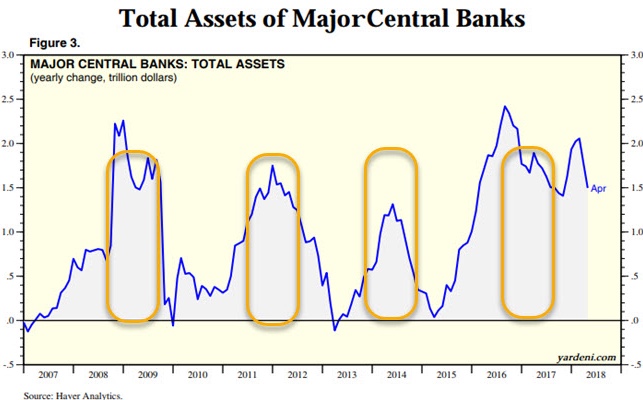
History has shown us that the height an asset bubble reaches is proportional to the damage it wreaks when it bursts. Applying this logic, the coming pop of the Everything Bubble will be devastating.
So devastating that analysts like John Hussman forecast a 0% (or worse) total market return over the next twelve years:
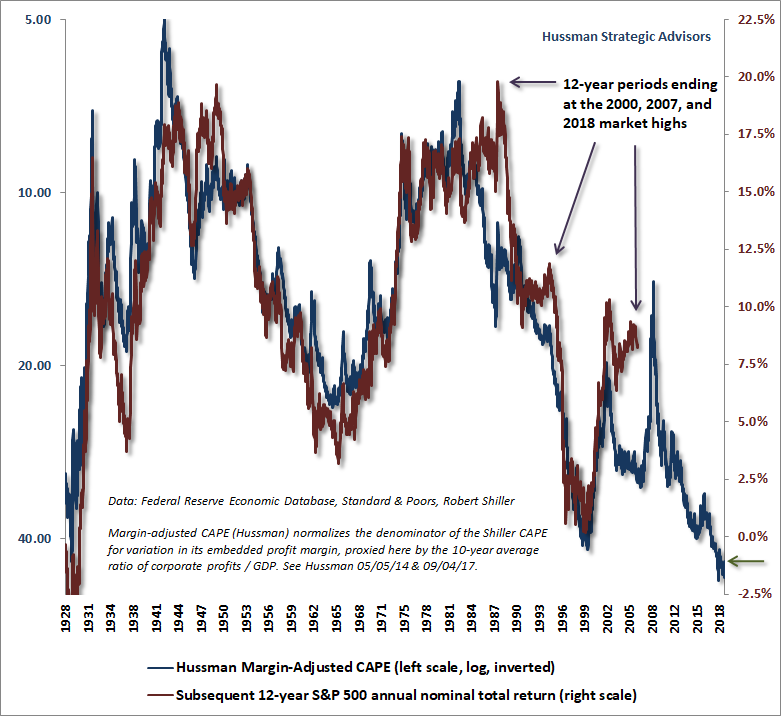
Moreover, the primary driver and supporter of asset price appreciation over the past seven years, central bank easing, is now gone. For the first time since the GFC, the collective central bank liquidity injection rate (the solid black line in the below chart) is now net zero.
And plans to tighten much further from here have been clearly committed and communicated to the world:
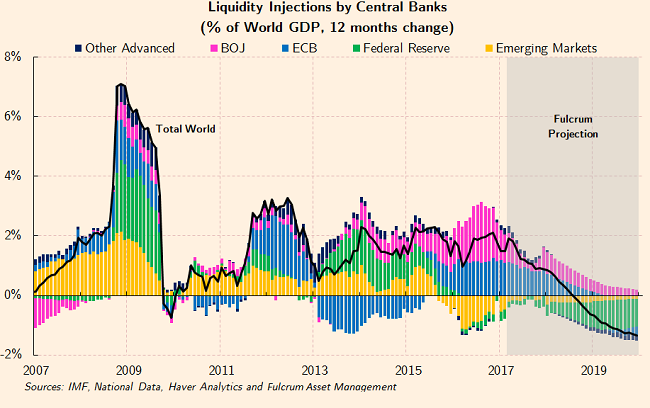
As a consequence, we fully expect yesterday’s capital gains to become tomorrow’s capital losses. What goes up on thin-air money comes down with its removal.
And while this is going on, interest rates are suddenly exploding higher around the world after spending a decade at all-time historic lows:
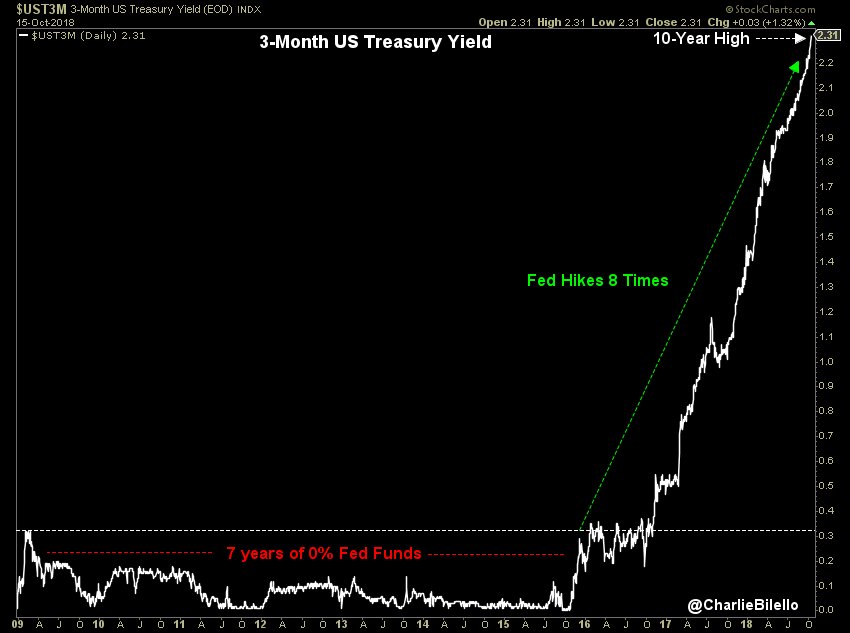
…click on the above link to read the rest of the article…



